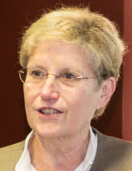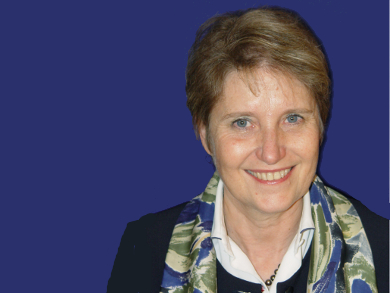Founded in 1857 to represent the interests of French chemists in various local, national, and international contexts, the Société Chimique de France (SCF) is still very active and innovative when it comes to linking chemists of all kinds with each other as well as with non-chemists.
Professor Gilberte Chambaud-Debrabant, President of the French Chemical Society (Société Chimique de France, SCF) and Professor Emeritus, University of Marne la Vallée, Paris, France, talks to Dr. Vera Koester of ChemViews Magazine about the SCF’s national and international activities, its challenges, and the place of chemists in modern society.
In three words, how would you describe your society?
Information, promotion, and representation: The SCF links chemists and non-chemists via regular shared information and promotes and represents chemists in France. In large part, these chemists belong to the academic community, but there are also school teachers and industry representatives among the members of SCF.
What makes chemistry in France and the SCF unique?
Compared to the German (GDCh) or English (RSC) chemical societies, the French Chemical Society is rather small, which is unfortunately in line with French culture. However, we have a way to compensate for our size: A very unique strength of chemistry in France, compared to other scientific disciplines, is the strong partnership established between the associations of chemists, namely, the SCF, the Union of Chemical Industry (UIC), the national research institution CNRS, via its Chemistry Institute (INC-CNRS), the Federation of the High Schools of engineers in Chemistry (Gay-Lussac Federation), the French Academy of Sciences, and the Foundation of la Maison de la Chimie.
Within this consortium we can coordinate actions to address large events, as was the case, for example, during the international Year of Chemistry in 2011, and today for the organization of the next IUPAC Conference in 2019 in Paris.
Who are your most famous members past and present?
When you look at the list of successive presidents of the SCF, starting in 1857, you are immediately impressed by these well-known chemists, including Pasteur, Friedel, Moissan, and so many others whose names are everywhere in the textbooks of chemistry.
Our more recent famous active members are our Nobel Prize Winners, Jean-Marie Lehn, and recently Jean-Pierre Sauvage, who are unfortunately not as widely known as footballers or politicians are. The actual President of CNRS, Alain Fuchs, is also a passionate chemist who has been president of the physical chemistry division of SCF.
What are the main challenges for your society?
Our main challenge is to convince French chemists that they would be stronger by defending their discipline and increasing its recognition by belonging to an association of chemists. It seems natural in many other countries to become a member of the national chemical society when you start a career as a chemist. In France this is not taken into account in a positive way by any of our evaluation institutions.
Another big challenge is to improve how chemistry is perceived in society, and for that we need to convince the media to look at the beneficial achievements of chemistry instead of focusing on the accidents related to the misuse of chemicals, including drugs.
Since 2013, you have been producing very interesting video series. Can you say something about that?
Videos are necessary to convey messages in our modern world. We are currently preparing a series on chemists from various categories such as Ph.D. students, technicians, engineers, and researchers in their everyday roles — for example, in their academic laboratories or industries. This aims to give students and pupils an idea of what jobs there are in chemistry and to show the public what chemistry is and that good people are involved in it.
With our previous series on the award recipients, we wanted to present brilliant personalities to our community.
The chemists themselves are the best ambassadors of chemistry in society, and we need their help. We have to show the links between the innovations and benefits of chemistry and the people who are making this possible. For example, only recently did I discover that one of our great French chemists, Pierre Potier, who did so much for the treatment of cancer with Taxotere, was almost unknown.
What makes chemical societies important today?
Chemical societies are important in highlighting the role of chemists, who should be recognized as strong actors in the development of society. Chemists have to be personally recognized for their own achievements. For that we have our journals, and we also have several prizes and awards.
In a broader sense, chemistry has to be recognized as a key innovative actor by society, by the media, and, specifically, also by politicians to influence some political decisions: In France, the Office Parlementaire d’Evaluation des Choix Scientifiques et Technologiques (OPECST) regularly asks scientific associations, including the SCF, for advice on educational or innovational problems.
What role do women in chemistry play in the SCF/in France?
Gender is not really a problem for French women in chemistry. They are present and recognized in many high-level positions as professors or research directors, or presidents of universities. However, they had to wait for a long period of time before being admitted to elite institutions such as the French Academy of Sciences. Marie Curie was never admitted there, but Odile Eisenstein, a French theoretical chemist who specialized in modeling the structure and reactivity of transition metals and lanthanide complexes, was elected three years ago as the first female chemist in the French Academy of Sciences. And I was also elected as the first female president of the SCF in 2015. Things are not so bad, but they are still progressing.
How does your society reach out to students?
At the youngest level, the SCF supports the National and International Olympiads of Chemistry. As far as students, Ph.D. students, or more generally, young professionals are concerned, we are lucky to have very active clubs of young chemists in each of our regional sections all over France. Moreover, these clubs are linked via a national network, the Réseau des Jeunes Chimistes (RJ-SCF).
They organize activities and meetings and they communicate among themselves using all the resources (e.g., Twitter, Facebook) that are popular among younger generations. Our young chemists are also involved in international associations like the European Young Chemists’ Network (EYCN) in Europe or, in the future, the International Young Chemists’ Network (IYCN).
How does your society communicate about science to the general public?
Our magazine, l’Actualité Chimique, is mailed not only to our affiliated members but also to gymnasium (secondary school) libraries, where it is used for education. We are involved in several initiatives that can reach the general public via our partnerships. With the Union of Chemical Industry we participate in the ‘Villages de la Chimie,’ an annual initiative that, together with the Foundation of ‘la Maison de la Chimie,’ and in particular its Chimie et Société (Chemistry and Society) association, we are organizing several series of events for the general public all over France, such as Chimie et Terroir (Chemistry and Countryside), which is presented in the middle of small cities over several days, next to the central markets. It aims to spark constructive debates with citizens and to show them the power but also the limits of science. An informed democratic debate requires that scientists can share their knowledge with citizens to broaden their ability to question and think about scientific advances.
What is the secret of running a successful society?
I would be very happy to know that secret inspiration. To my mind, an association of chemists should be present and visible whenever and wherever chemistry is involved. It also means that all the efforts of the volunteers should be appreciated and supported, because we need the participation of the largest number of chemists.
Please tell us a bit about how your career has developed.
From the very beginning I was fascinated by chemistry. I started in Ecole Normale Supérieure (ENS) as a student, then as an assistant professor, and finally as a professor.
Over twenty years in the chemistry department of ENS, I was able to develop my research activity in theoretical chemistry with Bernard Lévy and some administrative activities by helping Marc Julia. Then I took a one-year break to conduct research at the University of Frankfurt/Main, orienting my research toward theoretical spectroscopy with Pavel Rosmus. Back in France in 1990, I was appointed as professor in the brand new University of Marne la Vallée, where everything had to be started from scratch—research, education, and administration. Since 2003, I have been partially involved in the administration of research, first in the Ministry for Education and Research and then in the CNRS, as director of the chemistry department.
During my career, I have always tried to maintain a balance between research, education, and administration. Of course, I was also affiliated with the French Chemical Society (SCF), where I worked in the education division. I became an SCF board member in 2012 and became president of the SCF in December 2015.
What drives you?
I think that the driving force in my career has been to start and create new activities with partners. The fantastic field of scientific research and the scientific community offered that to me at different levels.
Who or what has inspired you most in chemistry and during your career?
The person who inspired my orientation toward theoretical chemistry has been Lionel Salem as I learned chemistry at the University of Orsay. It was the very beginning of computational chemistry, which opened huge new perspectives that I could instinctively foresee.
When I really started research, I worked first with a fantastic theoretician, Bernard Lévy with whom I learned more on the fundamentals of quantum chemistry. During this first part of my career I have been deeply marked by the justness and acuity of Marc Julia, helping him in the direction of the chemistry Department of ENS. Later, Pavel Rosmus introduced me to the domain of theoretical spectroscopy, which strongly connected theory and experiments. My stay in Frankfurt and the subsequent installation in the University of Marne la Vallée have been decisive steps in my career.
What do you do in your spare time?
Apart from reading, jogging, and gardening, I enjoy cooking. The kitchen is a creative chemistry laboratory where you can invent every day and that brings you a great deal of satisfaction.
What else would you like readers of ChemViews.org to know?
We have not yet mentioned Europe and the partnership of the European chemical societies within EuCheMS. The national dimension of a chemical society is, of course, very important for everyday life, and each country has its specificity, but we are living in a larger world. With our European partners we have to build a common strategy of development and we have to share common perspectives.
We already have a long shared history with the GDCh, which is a very important society for France, with strong, long-term collaborations between our members and with a common experience in scientific publications via ChemPubSoc Europe and with the ABC journals. This is something that will continue. I am happy to take the opportunity of the 150th anniversary of the GDCh to express my best wishes for its success in the future.
Thank you for the interview.

Gilberte Chambaud-Debrabant, born in Masny, France, in 1948, studied chemistry and earned her Ph.D. in theoretical chemistry from the Ecole Normale Supérieure (ENS) and the University P. et M. Curie, both in Paris, France, under the supervision of Bernard Lévy in 1980. From 1972–1977, she was an assistant professor, from 1977–1985 an associate professor, and from 1985–1990 a professor in the Department of Chemistry at ENS. From 1990–1991, she was a guest researcher at the University of Frankfurt am Main, Germany, in Pavel Rosmus’ group; from 1991–1992, she was a professor at ENS; and from 1992–2014, she was a professor at the University of Marne la Vallée, Paris, France. Since 2014 Chambaud-Debrabant has been a professor emeritus.
Chambaud-Debrabant held various positions such as Scientific Director of the Institute of Chemistry of Centre National de la Recherche Scientifique (CNRS), Scientific Advisor at the National French Agency for Evaluation of Research and Formation (AERES), President of the Education Division of the French Chemical Society, and member of the Board of the Synchrotron SOLEIL and of the Chemical Industry Society (UIC). She created the French–Chinese network in theoretical chemistry and implemented and coordinated the French Network of Theoretical Chemists with the support of the French Ministry of Research and Education.
Since December 2015, she has been President of the French Chemical Society (SCF).
Her research focused on molecular physico-chemistry including the determination of electronic structures, the potential-energy functions, and the spectroscopy of molecular or periodic species in the ground or excited states, and the study of their properties in relation to observable quantities.
Selected Awards
- Knight of the National Order of the Legion of Honor, 2007
- Officer in the National Order of Academic Palms, 2011




